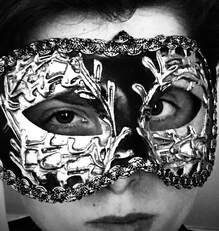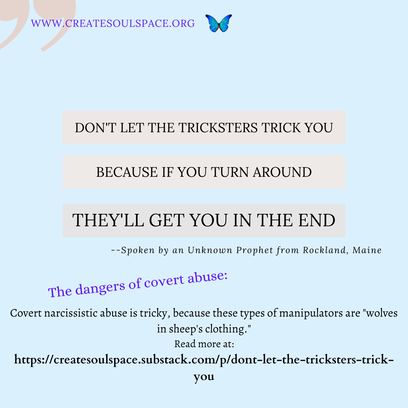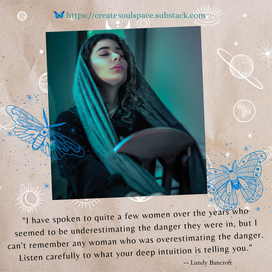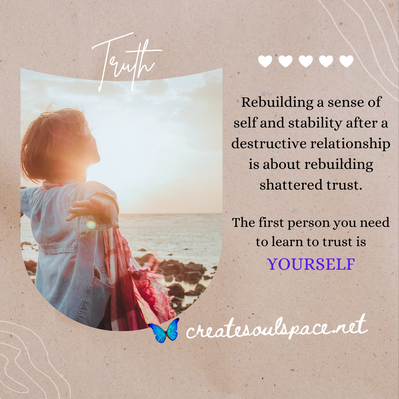Covert narcissistic abuse is tricky, because these types of manipulators are "wolves in sheep's clothing."“Don’t let the tricksters trick you, because if you turn around they’ll get you in the end.” What an odd saying! And what does it mean? First, let me give you a bit of background. One of my clients (“Juliet”) relayed to me that when she and her husband were newly married and she was still in the haze of not understanding what was wrong with her relationship, they went out for dinner. After paying the check and getting ready to leave, a strange and perhaps prophetic thing happened in the lobby of the restaurant, something that has stuck with her ever since. An elderly gentleman was standing at the exit, his back to Juliet and her husband, silently gazing out of the doorway as he waited for his ride to pull up. Without warning he spun around and stared at Juliet, unblinking and unapologetic, as if to give her an urgent message that he was unsure of himself, but that he knew must be said. “Don’t let the tricksters trick you, because if you turn around they’ll get you in the end,” he said, then just as abruptly he turned back around and walked out the door. Did he know something Juliet was failing to see? Was he trying to give her a warning?
0 Comments
One of the nasty side-effects of domestic abuse is the muffling of your own inner knowingness, yet that still, small Voice within is guiding you toward your best self -- and it's still there. You used to be able to sense things, feel things, know things otherwise unknowable, deep within yourself. There was a Voice within the very core of beinghood, the place St. Caterina of Siena called your Cell of Self-Knowledge. This Voice within was — and is, because even if you haven’t heard it in quite some time, it’s still there — the gift of divine guidance. It’s Truth, and Light, and Hope, and Love. It’s the Voice that tells you — Stop! Don’t go there! or All is well, proceed with joy. Some people call this knowingness their gut instinct, while others prefer to think of it as their intuition. Most of my readers are from the Catholic tradition, which recognizes a person’s inner knowingness as that “still small Voice” of the Holy Spirit, forever urging, guiding, and protecting (1 Kings 19:12).
From the moment of existence we were all gifted with what the fourteenth century German mystic, Meister Eckhart, called the “God-seed”—echoing Genesis 1:26, which states that all human beings are made in the image and likeness of God. In some Jewish traditions, this is called the Divine Spark. Whatever the label, the truth is this: we all hold deep and amazing reserves of spiritual protection and wisdom that we’ve barely tapped into. It takes a lifetime of love and prayerful seeking to reach our full, God-given potential. Talking to supportive friends can help you triumph through your journey from victim to survivor. I’ve received so many grateful emails about my article, "He Despises His Ex" that I decided a follow-up post was in order. Most of the messages I received were from readers sharing similar stories, and how they came to realize that something was seriously wrong with their partner. After all, a normal, empathetic, and cognitively-stable person doesn’t demonize others—no matter what the other person supposedly did. A normal, cognitively-stable person doesn’t obsess over what others did to them to the point of it interfering regularly with their lives. A normal, cognitively-stable person doesn’t make sure everyone knows how monstrous their ex was and how it negatively affected them—unless they’re chronically looking for a scapegoat to excuse away their own behavior. Other messages I received contained questions, most of which can be summed up like this: “I’ve told my friends about the bad things my ex did to me. Does that mean I have an abusive personality, too?” While I can’t say for certain since I don’t know each of you individually, the fact that you’re asking the question in the first place—and are genuinely concerned—is a clear indication of the answer: No. No, you are not abusive
|
AuthorJenny duBay, Trauma-Informed Christian life coach specializing in healing from betrayal trauma and domestic abuse. |







